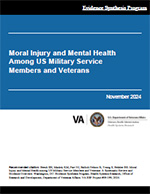
|
Recommended citation: |
Download PDF: Complete Report, Executive Summary, Report, Appendices, Visual Abtract
Among US Veterans and military service members, moral injury (MI) symptoms are likely correlated with greater PTSD, depression, and anxiety symptom severity, and exposure to potentially morally injurious events (PMIEs) may be correlated with greater symptom severity. MI symptoms and PMIE exposure may be correlated with increased suicidal thoughts and behaviors (STBs) and with greater substance use.
Clinical and research interest in the impacts of morally injurious events has increased over the past 2 decades. This report was requested by the Integrative Mental Health (IMH) initiative, supported by the VHA Office of Mental Health and Suicide Prevention (OMHSP), to characterize published literature on moral injury broadly across populations and to synthesize available evidence on the relationship between PMIEs and MI and mental health outcomes among US Veterans and military service members.
The pace of new research on MI has been accelerating, and the concept of MI is increasingly being applied to non-military populations, such as health care workers. About half of studies published to date have been conducted in the US and about half have been conducted among Veterans or military service members. Among US Veterans and military service members, MI symptoms are likely correlated with greater PTSD, depression, and anxiety symptom severity, and exposure to PMIEs may be correlated with greater symptom severity. MI symptoms and PMIE exposure may be correlated with increased STBs, greater substance use, and poorer relationship functioning and social engagement. Future research on the associations between PMIE exposure, MI, and adverse mental health outcomes using recently developed, improved measures will further clarify these associations. Future longitudinal research is needed to clarify the causal pathway between PMIE exposure, the development of MI, and adverse mental health outcomes.
Moral Injury and Mental Health Among U.S. Military Service Members and Veterans: A Systematic Review and Evidence Overview (Management Brief)